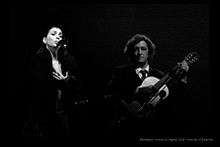Madredeus
Madredeus (Portuguese pronunciation: [maðɾɨˈðewʃ]) is a Portuguese musical ensemble formed in 1985. Their music combines traditional Portuguese music, fado, and influences of modern folk music. The songs' lyrics are often melancholic, related to the sea, travelling or absence, continuing a tradition of songs dating back to Medieval times (with obvious connection to cantigas de amigo among others).
Madredeus | |
|---|---|
 Madredeus in concert in Aveiro (2005). | |
| Background information | |
| Genres | World music barroque pop |
| Years active | 1985–present |
| Labels | EMI, Sony Music |
| Associated acts | Teresa Salgueiro |
| Members | Pedro Ayres Magalhães Carlos Maria Trindade Beatriz Nunes Jorge Varrecoso António Figueiredo Jorge Clode |
| Past members | Teresa Salgueiro Rodrigo Leão Francisco Ribeiro Gabriel Gomes Fernando Júdice José Peixoto |
Madredeus founding members were Pedro Ayres Magalhães (classical guitar), Rodrigo Leão (keyboard synthesizer), Francisco Ribeiro (cello), Gabriel Gomes (accordion) and Teresa Salgueiro (vocals). Magalhães and Leão formed the band in 1985, Ribeiro and Gomes joined in 1986. In search of a female singer, they found Teresa Salgueiro in one of Lisbon's night clubs. Teresa agreed to join and, in 1987, Madredeus recorded their first album, Os dias da Madredeus.
The first album was recorded in their rehearsal space, a converted abbey in Lisbon. The recording was especially strenuous due to deafening interruptions every 5 minutes from Lisbon's tram service, which ran directly above. In honour of this unavoidable presence in their every performance, they named themselves after the surrounding neighborhood, Madre de Deus (Mother of God), shortened to the vernacular Madredeus.
In 1993, Pedro Ayres Magalhães left the band temporarily and was replaced in live concerts by José Peixoto (classical guitar). Magalhães rejoined the group later, making it a sextet with two guitarists.
They released several albums and became very popular in Portugal, but remained relatively unknown abroad. This changed in 1994 when Wim Wenders, impressed by their music, asked Madredeus to perform in his movie Lisbon Story - the soundtrack gave the band international fame. Madredeus consequently toured Europe, South America, Africa and Asia.
In 1994, Rodrigo Leão left the band to start a solo career, being replaced by Carlos Maria Trindade (keyboard synthesizer).
In 1997, Francisco Ribeiro and Gabriel Gomes left the band as Madredeus' style started abandoning its fado roots with the release of O Paraíso. At this time Fernando Júdice (Acoustic bass guitar) was invited to join them. The group would, again, be a quintet.
In 1998, Madredeus contributed "Os Dias São A Noite (Suso Saiz Remix)" to the AIDS benefit compilation album Onda Sonora: Red Hot + Lisbon produced by the Red Hot Organization.
In November 2007, Teresa Salgueiro announced she had left Madredeus.
In April 2012 Madredeus announced its new album Essencia. This album is a travel through Madredeus music for 25 years since it was formed. Madredeus announced too its new formation, composed of Beatriz Nunes (singer), Pedro Ayres de Magalhães (guitar), Carlos Maria Trinidade (synthesizer), Jorge Varrecoso (violin), Antonio Figueirido (violin) and Luis Clode (cello). With this new formation Pedro Ayres said in an interview: "The melody is much more supported, without losing harmonic and rhythmic sense and keeps walking Madredeus".
Madredeus has sold over 3 million albums worldwide.
Solo careers of former members
Since leaving Madredeus in 2007, Teresa Salgueiro has released several solo albums.
Former member and co-founder Francisco Ribeiro released his first solo album Desiderata: A Junção do Bem in 2009. He died on 14 September 2010 from cancer.
Discography
- Os Dias da MadreDeus (1987)
- Existir (1990)
- Lisboa (1992, live in Lisbon)
- O Espírito da Paz (1994)
- Ainda (1995, soundtrack from Lisbon Story (1994 film))
- O Paraíso (1997)
- O Porto (1998, live at Porto)
- Antologia (2000, a compilation of 'best of' material)
- Movimento (2001)
- Palavras Cantadas (2001)
- Euforia (2002)
- Electrónico (2002)
- Um Amor Infinito (2004)
- Faluas do Tejo (2005)
- Metafonia (2008, feat A Banda Cósmica)
- A Nova Aurora (2009, feat A Banda Cósmica)
- Castelos na Areia (2010, feat A Banda Cósmica)
- Essência (2012)
- Antologia (2012, a compilation of the "Best of", 1987-2007)
- Capricho Sentimental (2015)